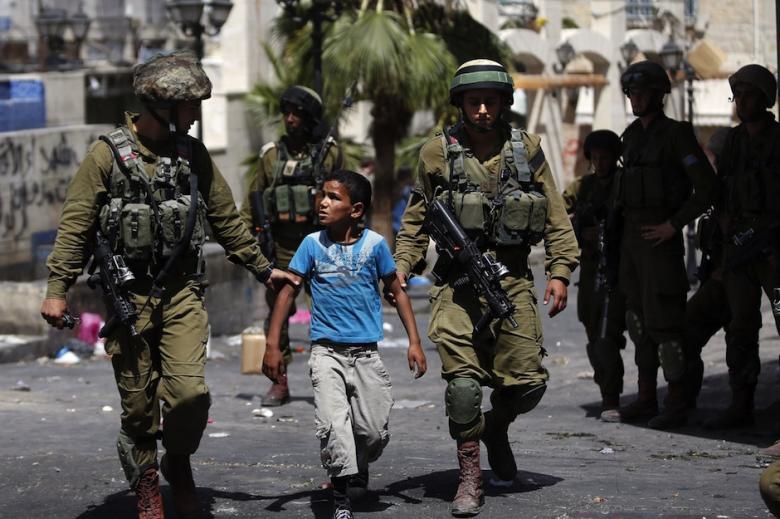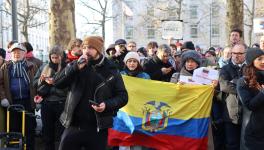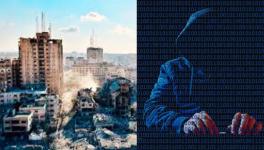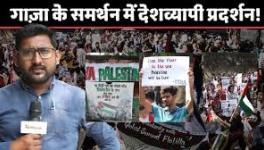Is Israel’s Ongoing Terror Campaign Punishment for Palestinian Unity?
As Israel continues its crackdown on the West Bank in the wake of three Israeli teenagers’ disappearance, the unrestrained violence of the occupying forces has seemingly developed into retribution for the recent establishment of a Palestinian unity government.
In the 11 days since the three Israeli settlers went missing while hitchhiking near the illegal Zionist settlement bloc of Gush Etzion in the West Bank, Palestinians have paid a heavy toll as the Israeli manhunt quickly turned into collective punishment.
Israel Occupation Forces (IOF) have searched countless Palestinian homes, media offices and schools in extensive raids, confiscating universities’ computers, destroying furniture, firing tear gas and live bullets at protesting civilians, a move seemingly more intent on furthering the control of the Palestinian population than finding the Israeli teenagers.
At least 471 Palestinians have been arrested since June 12. At least 75 of those arrested are former prisoners who had been released in a 2011 prisoner swap, according to the Palestinian Authority’s former Minister of Prisoner Affairs Issa Qaraqe.

Israeli soldiers arrest a young Palestinian boy following clashes in the center of the West Bank town of Hebron, on June 20, 2014. Israeli soldiers killed a 14-year-old Palestinian in the occupied West Bank as they pressed a crackdown on the Islamist movement Hamas in their search for three missing Israeli teenagers. (Photo: AFP-Thomas Coex)
“Resentencing prisoners who were released in the [20111 Gilad] Shalit deal is a form of immoral and illegal revenge, an offense to Egypt who sponsored the deal, and collective punishment that is against the human and legal rights of prisoners," he said on Saturday.
He added that 241 Palestinian minors were now locked up in Israeli jails, 45 more than in May according to statistics by prisoners’ rights NGO Addameer.
Palestinians have paid a heavy toll as the Israeli manhunt quickly turned into collective punishment.
The prisoners have been placed in administrative detention, a practice whose excessive use by Israel has been denounced as being illegal under international law by rights groups.
Israel has imposed a tight blockade on Hebron, and a curfew on the northern West Bank city of Nablus.
Meanwhile, the Gaza Strip has sustained nightly air raids for the past week. The already isolated enclave has been subjected to an even more stringent siege, as an Israeli Defense Ministry statement on June 15 declared that the Erez crossing would be limited to humanitarian cases, while only fuel would be allowed in through the southern goods crossing.
Operation “Brother's Keeper” keeps claiming Palestinian lives
At least five Palestinians have died during Israeli military operations in the West Bank since June 12. All available information indicates that the victims were unrelated to the disappearance of Gilad Shaer, Eyal Ifrach and Naftali Frenkel.
The first casualty was Ahmad Arafat Sabarin, who was shot dead on Monday during a military raid in the Jalazoun refugee camp north of Ramallah. He was 19 years old.
On Friday, 14-year-old Mohammed Jihad Dudin was shot in the chest with live bullets in an Israeli raid on the village of Dura, near Hebron. Photos of Dudin show a skinny, smiling child.
Translation: Mohammed Dudin, 13 years old from Dura, near al-Khalil, was martyred.
In Nablus, Jamil Ali Abed Jaber, 60, died of a heart attack as Israeli troops searched his house on Saturday. Palestinian security sources reported that Abed Jaber’s family was prevented from taking him to the hospital, leading him to die inside his home.
Early on Sunday June 22, Israeli troops in Ein Beit al-Mai refugee camp in western Nablus shot dead 36-year-old Ahmad Fahnawi, who was on his way to morning prayers as clashes were taking place. Eyewitnesses told Ma’an news agency that a soldier shot Fahnawi several times from point-blank range.
The Israeli army confirmed firing at a “suspect,” claiming he had approached troops "in a threatening manner." However, Fahnawi’s family told AFP that he suffered from mental health problems.
Israeli troops also killed 30-year-old Mohammed Mahmoud Atallah Tarifi on Sunday during a crackdown in central Ramallah, Palestinian medics reported.
An untold number of Palestinians have been injured so far in Operation “Brother’s Keeper.”
International and Arab silence
Most of the Israeli public was quick to support the army’s actions in the West Bank. The hashtag "BringBackOurBoys" rapidly made the rounds on Twitter, a move criticized by some as an insensitive appropriation of the #BringBackOurGirls campaign in Nigeria, where over 200 girls are still held captive by Boko Haram.
Meanwhile, a Facebook page titled “Until the boys are back, every hour we shoot a terrorist” has accumulated more than 20,700 likes since its creation on June 13. The page vocally supports widespread violence against Palestinians as ‘punishment’ for the disappearance of the three Israelis.
While several rights groups have condemned Israel’s violent policies and rhetoric, a significant portion of the international community has come out in support of Israel’s ‘search’ for the teenagers, justifying the Zionist state’s military actions without addressing their impact on Palestinians.
"The European Union has called for the immediate and unconditional release of these three boys – it is, frankly, despicable that children's lives should be put in danger in this way," EU Ambassador to Israel Lars Faaborg-Andersen said on Tuesday, referring only to Israeli children.
“Israeli suffering has to be understood,” the mayor of Buenos Aires, Mauricio Macri, said during a conference on Wednesday with 19 other world mayors standing in support of Israel.
Even supposedly pro-Palestinian Arab countries have so far failed to condemn the Israeli raids or express condolences for the loss of Palestinian lives.
While there has been no shortage of lamentations about Israelis’ shared pain over the missing teens, the international community has remained silent about the plight of Palestinians. Even supposedly pro-Palestinian Arab countries have so far failed to condemn the Israeli raids or express condolences for the loss of Palestinian lives.
The Palestinian Authority's collaboration with Israel
Almost as soon as the three settlers went missing, Israeli Prime Minister Benjamin Netanyahu accused Hamas of being behind their disappearance, a charge Hamas dismissed immediately.
"Our young people have been kidnapped by a terror organization... there is no doubt about that," Netanyahu told reporters in Tel Aviv on June 14.
The Israeli government has yet to provide any proof of its claims. On Tuesday, a spokesperson for United Nations leader Ban Ki-Moon, Farhan Haq, said that the UN had “no information to confirm an abduction.” This statement was quickly denounced by Israel as “out of touch, out of line and out of time.”
Downplaying the crackdown as “friction,” Netanyahu said on Sunday that evidence of Hamas’ involvement would be made public “soon,” the Jerusalem Post reported.
Meanwhile, the Israeli government has dismissed Palestinian casualties as a consequence of “necessary” Israeli “self-defense.”
Netanyahu has also targeted Palestinian Authority (PA) President Mahmoud Abbas, holding him responsible despite the latter’s swiftness in condemning the alleged kidnapping.
The Israeli premier’s hostility towards the PA is all the more incomprehensible given the Palestinian Authority’s ongoing security coordination with Israel.
Palestinian police have worked with Israel intermittently since the Oslo Accords, but the security arrangement has been strengthened since Abbas came to power in 2005.
Palestinians have long been angered by the PA’s collaboration with the IOF, and Operation “Brother’s Keeper” has only exacerbated the perception of PA security acting as agents for Israel. Witnesses have seen PA forces arresting individuals in hospitals, and a demonstration by mothers of hunger striking prisoners on Friday was attacked by Palestinian police.
On Sunday night, PA security forces clashed with Palestinians protesting against their coordination with Israel. With support from the IOF, PA security shot in the direction of the crowd in Ramallah, injuring at least one person.
But it seems collaboration with Israeli brutality is not enough for Netanyahu.
“[Abbas’] words will not only be judged in terms of actions taken to bring the boys home, but also by his willingness to break up the unity government with Hamas,” he said.
Statements by IOF Chief of Staff Benny Gantz confirmed that undermining Hamas is a main goal of the Israeli military operation.
"We have a goal: to find these three boys and bring them home, and to damage Hamas as much as possible," Gantz said on June 16.
The missing settlers: a pretext
Netanyahu’s demands support the idea that the ongoing brutal operation is not only intended to locate the three settlers, but to punish Palestinians after the recent reconciliation between Fatah and Hamas and to sabotage the newly-created unified Palestinian government.
In an interview with ultra-Orthodox news outlet Hadrei Haredim published on Thursday, an IOF officer revealed that parts of Operation “Brother’s Keeper” had been planned long before the teenagers went missing. Notably, he said that the Israeli army had already prepared for an operation in Jenin in which soldiers were to purposefully provoke residents into throwing stones, and then use the clashes as an excuse to kill Palestinians.
This disclosure -- among other statements -- backs the idea that Israel is knowingly creating an unlivable situation for Palestinians only to blame them for pushing back, perpetuating its myth of Palestinian aggression as it has many times before. Despite decades of occupation, Israel continues to frame Palestinian resistance as unprovoked aggression, breaches of international law as legitimate defense, and oppressors as victims.
These provocative Israeli tactics are not new. In 1976, then-Israeli Minister of Defense Moshe Dayan explained the 1967 military tactics to the New York Times:
”Along the Syria border there were no farms and no refugee camps — there was only the Syrian army... The kibbutzim saw the good agricultural land ... and they dreamed about it... They didn't even try to hide their greed for the land... We would send a tractor to plow some area where it wasn't possible to do anything, in the demilitarized area, and knew in advance that the Syrians would start to shoot. If they didn't shoot, we would tell the tractor to advance further, until in the end the Syrians would get annoyed and shoot. And then we would use artillery and later the air force also, and that's how it was...The Syrians, on the fourth day of the war, were not a threat to us.”
Lebanon has similarly suffered from Israel using flimsy pretexts to push forward ulterior plans against its enemies, as noted by Electronic Intifada co-founder Ali Abunimah.
The notion of Palestinian unity is a threat to Israel, and it will do anything in its power to weaken it. A unified Palestinian political front, having somewhat resolved its internal conflicts, could make a stronger claim for self-determination, a scenario that would further expose Israel’s unreasonable demands for "peace" and its divide and conquer strategies.
Israel, therefore, uses any pretext to try to stifle Palestinian aspirations, attempting to reduce an entire population’s existence to a question of mere survival.
Many Palestinians - adults and children alike - will continue to suffer as long as Israel is allowed to act unabated, using the undetermined fate of the three Israelis until it finds another excuse to continue its policy of repression, injustice and divisiveness.
Courtesy: english.al-akhbar.com
Disclaimer: The views expressed here are the author's personal views, and do not represent the views of Newsclick
Get the latest reports & analysis with people's perspective on Protests, movements & deep analytical videos, discussions of the current affairs in your Telegram app. Subscribe to NewsClick's Telegram channel & get Real-Time updates on stories, as they get published on our website.























